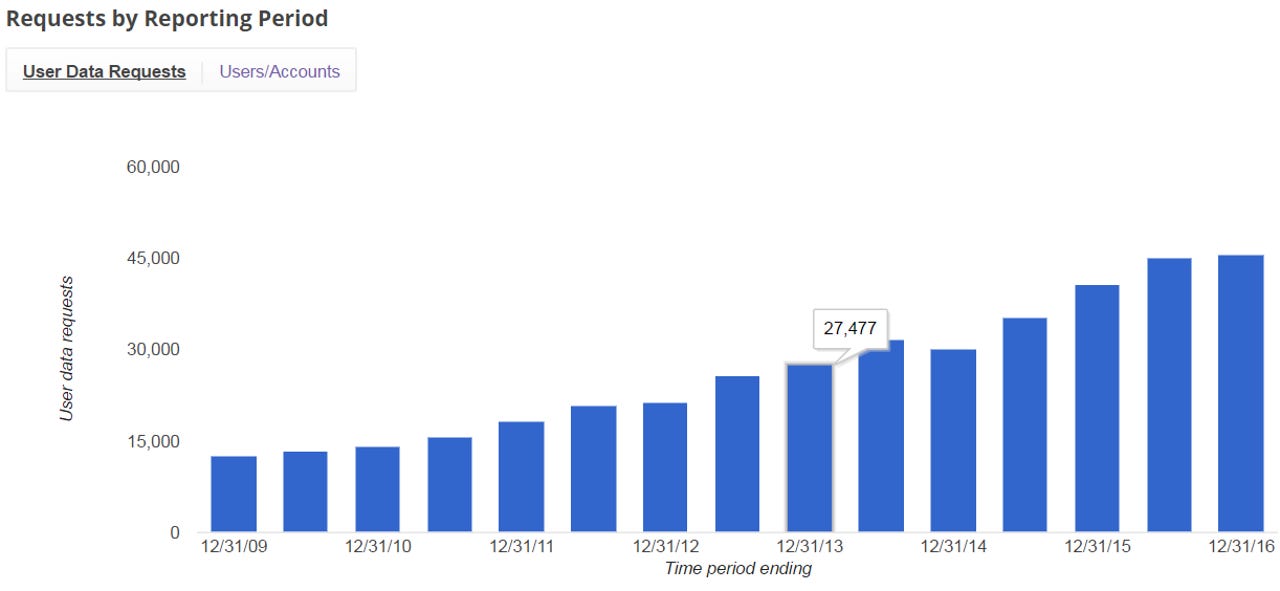Google: Requests for users' data have soared, so we need new cross-border rules


Although Google is processing more requests, it's also producing data for a smaller share of them.
Government requests for Google user data in the second half of 2016 were the highest since the company first reported the figures in 2009.
As Google notes in its latest Transparency Report, it received 45,549 government requests for user data in the second half of 2016, of which about 31,000 or 70 percent were from non-US governments. In 2009, it received 12,000 requests in total, with a similar proportion coming from non-US governments.
Although Google is processing more requests, it's also producing data for a smaller share of these requests. In 2010, it produced some user data for 76 percent of requests, a figure that's steadily fallen in each period to 60 percent in the second half of 2016.
Security
However, due to a persistently high volume of requests from international governments Google is calling for a more efficient legal process than the Mutual Legal Assistance Treaty (MLAT). It allows non-US countries that have an agreement with the US to seek electronic evidence from US tech firms via the Justice Department.
Over the past three years US requests have remained steady, while European law-enforcement requests continue to grow. Requests by the US are down slightly to 13,682 from 14,168 in the first half of 2016.
Germany meanwhile made 9,925 requests, more than triple the volume in the corresponding period in 2014, and up from 8,788 in the first half of 2016. Requests from France are up from 4,300 in the first half of 2016 to 4,755 in the current period, while UK requests are down slightly from 3,302 in the first half to 3,177.
Ken Walker, senior vice president and general counsel at Google, points to a 2013 US government report that found it took 10 months to process an MLAT request in the US.
"Without better and faster ways to collect cross-border evidence, countries will be tempted to take unilateral actions to deal with a fundamentally multilateral problem," he said.
The government report highlights that sluggish MLAT processes may incentivize countries to create laws that give law enforcement faster access, and contribute to the balkanization of the internet.
"These delays provide a rationale for new laws that require email and other records to be held in the other country, thus contributing to the harmful trend of localization laws," the report notes.
As Microsoft's Irish email court battle demonstrated, the US government doesn't always view MLAT processes as the desired route.
Another problem is how MLATs are perceived by courts, which has created legal issues for tech firms in the past.
Walker says Google plans to reveal more about what an ideal replacement for the MLAT would look like in coming weeks and months. Microsoft's lawyers have previously called for the US and other governments to adopt a more international approach to cross-border cooperation.
"We believe that governments can develop solutions that appropriately balance the various interests at stake," said Walker.
"This includes respecting the legitimate privacy rights of users, wherever they are, as well as the obligations of governments to investigate crimes and protect their residents.
"The conversation should include a broad group of stakeholders, including not just law enforcement and national security perspectives, but also the voices of citizens, civil society groups and providers of information services that cross national borders."
Read more on Google
- Chrome: Is ad giant Google about to roll out in its own ad blocker?
- Alphabet's Verily kicks off long range study to track human health
- Google's giant Earth update: Now you get storytelling, better 3D, plus guided tours
- Google's VR push: Now you can try out Chrome WebVR with Cardboard viewer
- Google Hangouts Chat: The smart person's guide (TechRepublic)
- Google's new mission: reduce trolling through education (CNET)